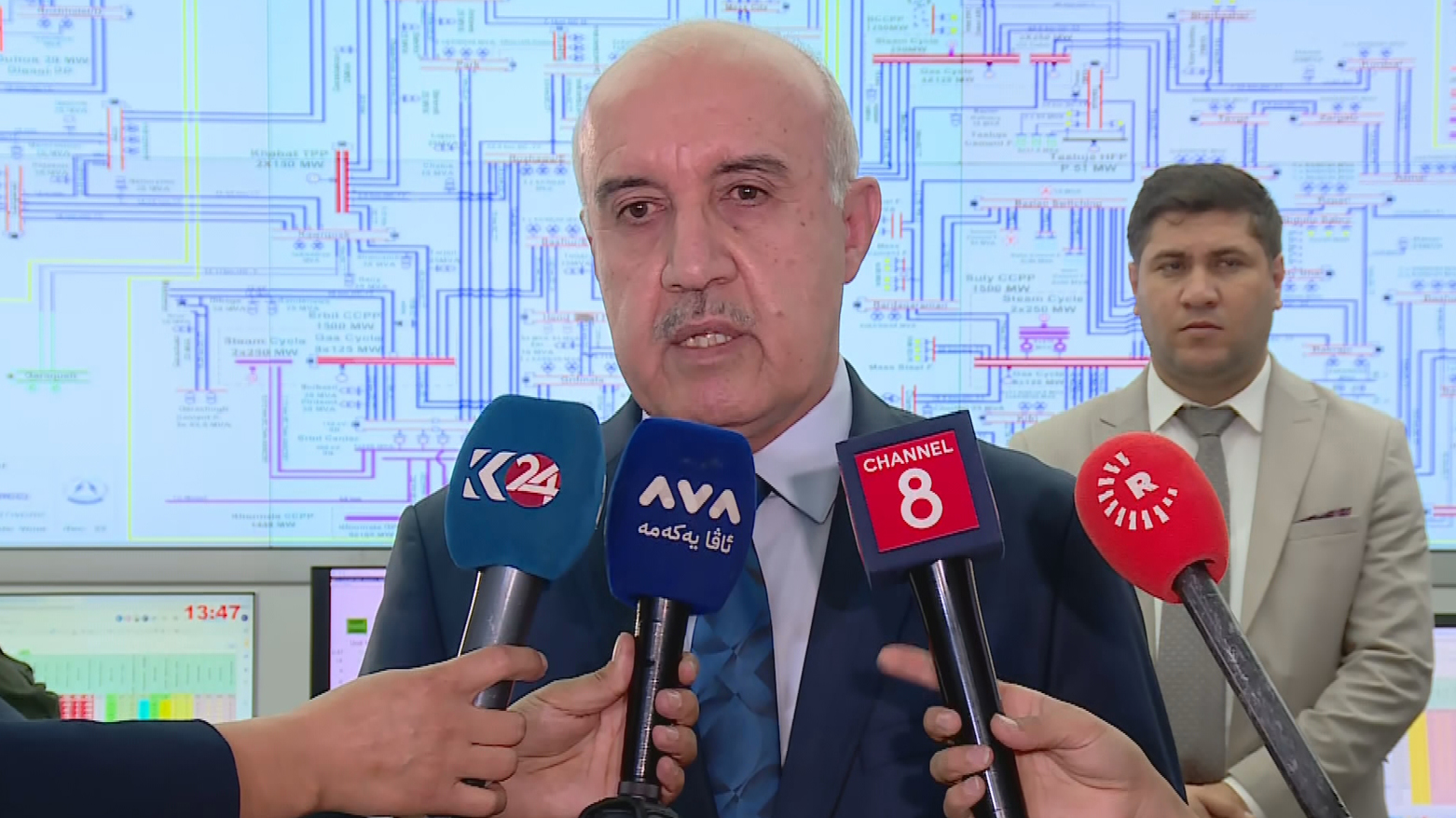Kurdistan Electricity Minister Sets 48-Hour Timeline for Power Restoration
Kurdistan's Electricity Minister announced power could restore within 48 hours if Kor Mor's production units remain undamaged, following Wednesday's attack that cut 300 MW from the grid and reduced generation to 1300-1400 MW.

ERBIL (Kurdistan24) - Kurdistan Region’s Acting Minister of Electricity and Natural Resources, Kamal Mohammed Salih, said on Thursday that the Region’s power supply could return to normal within 24 to 48 hours, provided the attack on the Kor Mor gas field did not damage critical production units.
Speaking at a press briefing on Thursday, the minister outlined the extent of the disruption caused by the previous night’s strike on one of the Kurdistan Region’s most vital energy assets, located in Chamchamal district of Sulaimani province.
The minister said the “terrorist attack” took place at approximately 11:30 PM on Wednesday night. Security forces have since visited the site and launched a full investigation into the nature of the strike and its source.
Before the attack, Kor Mor was producing around 530 million standard cubic feet of gas per day, supplying 15 power stations across the Kurdistan Region. Electricity generated from this output was distributed to cities throughout the KRI, and a portion was also supplied to Iraq.
According to the minister, the attack immediately removed 270–300 megawatts from the Kurdistan Region’s national power grid, reducing current generation to approximately 1300–1400 MW. He noted that available electricity is now being distributed based on provincial priority to ensure hospitals, schools, public institutions, and essential services remain powered.
One of the key products of the Kor Mor field— (household gas)—was also disrupted. The ministry therefore requested emergency oil supply from Iraq’s Ministry of Oil to keep household gas production stable. “They have promised to deliver the required amount by tomorrow morning,” the minister said.
He added that Iraq’s Minister of Electricity personally contacted him, offering technical assistance to help stabilize the power situation. “We appreciate the position of both ministries in Baghdad,” he stated.
Minister Salih emphasized that the Kurdistan Region urgently needs an air-defense protection system to safeguard its energy infrastructure.
“Our main request — which we discussed days ago with an American delegation — is securing an aerial defense system. It must be provided as soon as possible so that the oil and gas fields of the Kurdistan Region are not turned into targets,” he said.
He stressed that attacking gas and oil installations harms every stakeholder, including Iraq. “Those responsible must be arrested and brought to justice so that such attacks do not continue threatening the Region’s energy backbone.”
According to Minister Salih, technical teams from the ministry and partner companies will enter the field after security services finish their inspection to assess the exact damage.
“If the attack targeted only the gathering station and caused no further damage, I expect—based on current estimates—that the electricity situation in the Kurdistan Region could return to normal within 24 to 48 hours,” he said.
He also disclosed that the KRG recently signed a six-month agreement with private generator owners. Under this arrangement, if the public power supply drops, generators must provide electricity to citizens — and in such cases, the government will compensate generator owners, not the consumer.
“Right now, generator owners are supplying power based on this agreement,” he confirmed.
The Kor Mor Gas Field, located in the Qadir Karam subdistrict of Chamchamal in Sulaimani province, is considered the largest natural gas field in Iraq and the Kurdistan Region. It plays a vital role in powering the KRI and driving economic and industrial activity.
History and Reserves
-Discovered in 1928, known until 2003 as the “Anfal Field.”
-After 2003, it came under administration of the Kurdistan Regional Government (KRG).
-Covers approximately 135 km².
-Holds an estimated 17 trillion cubic feet of proven natural gas reserves.
Operators
Kor Mor is operated by Pearl Petroleum, a consortium of:
-Dana Gas (UAE)
-Crescent Petroleum (UAE)
Both companies have played central roles in developing, expanding, and managing the field.
Production Capacity
Kor Mor’s production has expanded significantly in recent years:
-Current gas production: around 750 million standard cubic feet per day.
-Condensate: approx. 15,200 barrels per day.
-LPG: around 1,070 tons per day.
The completion of the KM250 expansion project eight months ahead of schedule increased production by 50%, with future plans to raise output toward 1 billion scf/day.
Strategic Role in Kurdistan’s Power Grid
-Kor Mor alone supplies around 67% of the Kurdistan Region’s electricity generation.
-Gas is piped to the Chamchamal, Erbil, and Bazian power stations.
-Any interruption can instantly remove up to 2000 MW from the grid.
-The field also supplies crucial feedstock for household gas production.
Security Concerns and Repeated Attacks
Kor Mor has been targeted multiple times over the past several years by rocket and drone attacks. These incidents have repeatedly:
-disrupted gas production,
-reduced national electricity supply,
-caused material damage and fatalities.
The deadliest of these occurred in April 2024, when four foreign workers were killed.
Regional and international actors have consistently condemned these attacks as acts of terrorism and attempts to destabilize Iraq’s sovereignty and the KRG’s economic stability.
Minister Salih reaffirmed today that the Kor Mor project will continue, and that security measures are being reinforced to protect the field and the Region’s energy infrastructure.